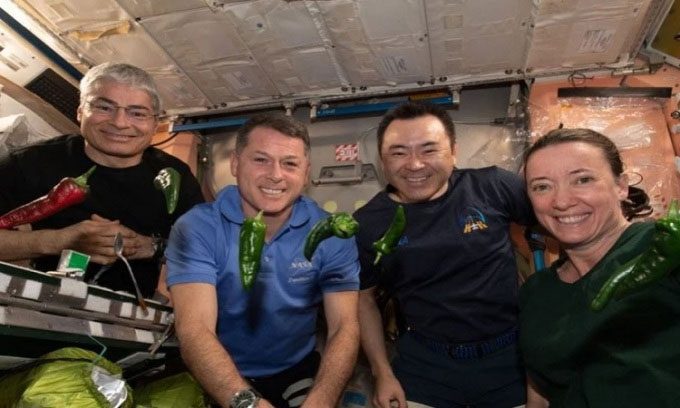NASA’s pepper growing and harvesting experiment in space sets records for providing food to the most astronauts and for being the longest experiment on the ISS.
This is the second time astronauts have grown peppers in space. In November 2021, the crew aboard the International Space Station (ISS) used the harvested peppers to make tacos, served with beef fajitas and vegetables.

ISS crew and the peppers grown on board. (Photo: NASA).
On December 3, Matt Romeyn, the lead researcher for the pepper growing experiment, shared that NASA’s crop production team did not expect the experiment to set two records. The peppers grown in space were harvested slightly later than those on Earth. This means the experiment on the ISS could be extended by an additional 17 days. The pepper seeds at the center of the Plant Habitat-04 (PH-04) experiment grew for four months before being harvested in October.
The experiment schedule coincided with the crew change from Crew-2 to Crew-3, allowing more astronauts the opportunity to sample the peppers, according to Romeyn. The scientist noted that growing vegetables in space contributes to the health of astronauts.
In the recent experiment, researchers planned to grow peppers over 120 days. However, the pepper plants grew for 137 days, making it the longest experiment on the ISS. The previous longest experiment occurred in 2016 when zinnias lasted for 90 days. The pepper growing experiment involved sampling Hatch peppers from New Mexico, placing them in a growing environment, and figuring out how to cultivate plants to bear fruit for the first time in space.
Tacos are the astronauts’ favorite dish after harvesting the peppers. According to Romeyn, the peppers are very spicy. All signs indicate that some peppers are spicier due to the effects of the microgravity environment on the concentration of capsaicin in the peppers. Following the success of the PH-04 experiment, in the next planting, the research team at the Kennedy Space Center plans to grow dwarf tomatoes and test new varieties of leafy greens.





















































